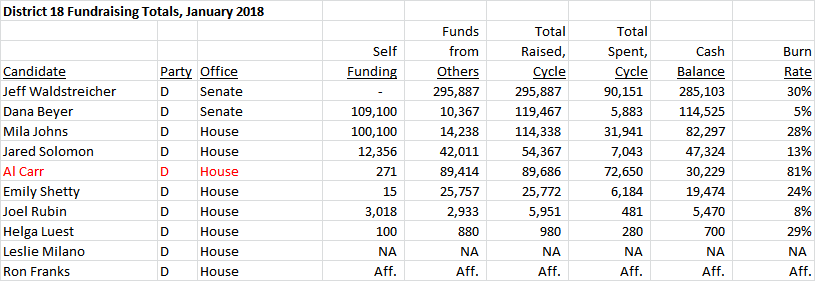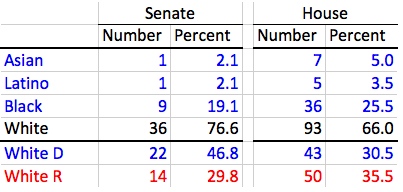The Top Line
(1) Incumbents Maricé Morales and Joe Vallario will not be returning to the House of Delegates.
(2) Will Kathleen Dumais replace Vallario as Judiciary Committee Chair?
By the District
Republican Dels. Kathy Szeliga and Rick Impallaria traded barbs during the delegate race in D7 (Baltimore & Harford). Szeliga won the first spot with 23% to 15% for Impallaria. The third nomination went to newcomer Lauren Arikan with 14%, who led Aaron Penman with 11%.
In one of the few districts with split delegations, incumbent D8 (Baltimore) incumbent Republican Joe Cluster (25%) will be joined on the ticket by Joseph Boteler (21%) and Joe Norman (19%). On the Democratic side, incumbent Eric Bromwell (31%) will run with Henry Bhandari (28%) and Carl Jackson (25%)
In District 9B (Howard), former County Councilmember and County Exec Candidate Courtney Watson is set to take on incumbent Republican Del. Bob Flanagan. Watson won the Democratic nomination with 66%,
In District 10 (Baltimore), incumbent Del. Jay Jalisi easily won renomination despite tumultuous headlines during his first term regarding a physical altercation with his daughter.
In District 15 (Montgomery), Lily Qi looks set to join Dels. Kathleen Dumais and David Fraser-Hidalgo in this comfortable Democratic seat. Dumais led with 22%. Fraser-Hidalgo, who tragically lost his wife in the middle of the campaign and had to focus on his kids and grieving, came third with 17%. Qi won 18% to 14% for Amy Friedler and 12% for Kevin Mack.
In District 16 (Montgomery), incumbent Dels. Marc Korman and Ariana Kelly easily won renomination. Samir Paul is leading Sara Love for the third seat by 118 votes, or 0.3%, with absentee and provisional ballots yet to be counted.
Incumbent Del. Kumar Barve led in D17 (Montgomery) with 26% followed by Rockville City Councilmember Julie Palakovich Carr with 25%. Despite being opposed by incumbent Sen. Cheryl Kagan, Del. Jim Gilchrist easily won a third term with 20%. Kagan-endorsed Julian Haffner trailed with 13%.
In D18 (Montgomery), it looks like Adam Pagnucco called it as incumbent Al Carr led the field with 22% followed by Emily Shetty at 20% and Jared Solomon at 18%. Leslie Milano finished in fourth with 14% with Town of Chevy Chase Councilmember Joel Rubin in fifth with 11%.
In D19 (Montgomery), incumbent Maricé Morales conceded graciously as she fell into fourth place with 16% after losing the Apple Ballot. Her ticket mate, incumbent Bonnie Cullison, led the field with 21%. Making a second bid, Charlotte Crutchfield roared into second with 18% of the vote. She’ll be joined by Vaughn Stewart who came in third with 17%.
In D20 (Montgomery), the ticket of incumbents David Moon (28%) and Jhenelle Wilkins (24%) accompanied by newcomer Lorig Charkoudian (19%) easily won. The race was soured towards the end when fourth place candidate Darian Unger’s (14%) campaign manager, John Rodriguez, was caught on tape throwing out literature for the winning ticket. Unger promptly fired him.
In D21, (Prince George’s), incumbent Dels. Joseline Peña-Melnyk (30%) and Ben Barnes (25%), were renominated and it looks like they be joined by Prince George’s County Councilmember Mary Lehman (19%). Matt Dernoga (18%), who formerly worked for Lehman, trails her by 173 votes.
In D23A (Prince George’s), incumbent Del, Geraldine Valentino-Smith looks to have only narrowly beat back a challenge by Shabnam Ahmed, a former student member of the Prince George’s County Board of Education. Valentino-Smith leads by 35 votes (0.6%) with absentees and provisionals yet to be counted.
D23B was equally interesting as longtime Judiciary Chair Joe Vallario lost with 22% of the vote. He was beat by incumbent Del. Marvin Holmes (27%) and Ron Watson, a former member of the Board of Education and O’Malley political appointee. Vallario was seen as a conservative barrier to progressive initiatives in the House. Vice Chair Kathleen Dumais, an excellent legislator, should be well positioned to succeed him as Chair. However, Anne Kaiser and Kumar Barve from Montgomery already hold powerful committee chairs, which could complicate matters for the Speaker.





